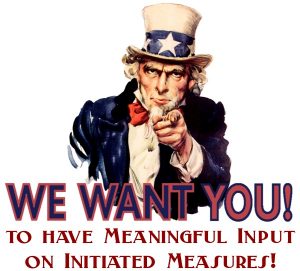I’ve expressed my tepid “better-than-nothing” support for two Republican bills today. Now let’s turn to a Republican bill that needs to be killed: House Bill 1130, another ploy in the Republican effort to make it harder for us voters to put initiated laws and constitutional amendments to a vote.
On face, HB 1130 looks like a good idea, seeking public comment on ballot measures. It adds a 30-day period during which citizens may submit public comment on a proposed initiative (law or constitutional amendment) on the Secretary of State’s website (no cussing, please!). Then the Legislative Executive Board conducts a public hearing to review the proposed initiative and public comment and provide an overview to the initiative sponsors.

I love public input. The 30-day comment period sounds like part of an idea I’ve proposed to create a sort of statewide committee process to give initiative sponsors a chance to engage the public in conversations that would help refine their proposals and put even better language on the ballot.
But useful public input for stronger initiatives isn’t what the Republican sponsors of HB 1130 are after. Prime sponsors Rep. Don Haggar and Senator Al Novstrup are just sabotaging petition drives with useless delay:
- The comment period takes place after the final language for the petition is filed, meaning sponsors can’t use the public comments to improve their proposals. In short, it’s just a 30-day gripe session.
- The hearing by the Executive Board happens after petition language is finalized, so the Executive Board’s review can’t contribute to refining the initiative language, either.
- Sponsors can’t hit the streets with petitions until after the 30-day public comment period and the Executive Board hearing. That process takes away at least 37 days of precious circulating time. HB 1130 specifies no timeframe for the Executive Board meeting, so Legislative leaders could delay circulation for several more days or weeks.
Public comment and E-Board review aren’t bad in themselves, but these useless delays are unacceptable. Either kill HB 1130, or make three vital changes:
- Open and complete the 30-day public comment period before sponsors must submit their final petition language to the Secretary of State. This change allows sponsors to incorporate public comment in their final language.
- Set a clear timeframe for the E-Board’s review and comment, due one month after the end of the public comment period.
- Move the deadline for submission of signed petitions from a year before the general election (early November of the odd year) to the end of June the year of the general election. Ideally, make the initiative deadline the same as the even-year referendum deadline, 90 days after the end of the Legislative Session. That additional time compensates for making petitioners wait 30 days for public comment and another 30 days for E-Board review. The later submission deadline also gives sponsors plenty of time to consider and incorporate that public omment into their final drafts.
HB 1130 further reduces the time petitioners have to collect signatures without any meaningful benefit to the initiative process. Without all three of these changes I propose here, HB 1130 must be rejected as an undue burden on the people’s right to legislate.
House State Affairs takes up HB 1130 tomorrow (Wednesday) morning at 7:45 in Room 414 of the Capitol. The committee has also scheduled discussion of three other anti-initiative bills:
- SB 59: Senator Jim White’s delay of enactment date of approved ballot measures to give the Legislature more cover to repeal our ballot measures before they have a chance to do any good;
- HB 1074: Rep. Spencer Gosch’s unworkable and unconstitutional effort to limit out-of-state contributions to ballot question committees; and
- HB 1153: Rep. Gosch’s similarly unworkable scheme to force ballot question petitioners to visit at least 34 counties to get signatures.
It is indeed unfortunate that the hoodwinking by the big-dark-money out-of-state interests is forcing these sorts of measures and wrecking the whole thing for our rule-abiding South Dakotans. But we need to crack down on the hoodwinking and big-dark-money. All of the big-dark-money. And all of the lying and hoodwinking, like the IM #22 fed us.
Grudz, you’re off topic. HB 1130 has nothing to do with your hobby horse. Please get off it and offer some analysis of the impacts of HB 1130’s public comment and additional delays.
Mr. H, as you stated your suspicion of Mr. Novstrup, the elder, and his other people who wrote this, I am squarely on your point. The abuse of the measure initiating process finally broke the camel’s back with The IM #22 abuse and unconsitutionality and mess that the legislatures has had to clean up.
This is Mr. Novstrup and the other most senior and experience in the legislatures turning around and whacking back at that process. They may not even mean to pass that law bill but just to have a conversation and scare some of the bringers of measures into making sure future ones are not so sloppily written. I am square on point.
More distraction. I mentioned Novstrup once, without reference to IM22. You did not mention Novstrup; you simply reiterated your complaints about a dead initiative.
Nothing that happened in the 2016 election cycle justifies attacking the I&R process with the needless delay and reduction of petition circulation time. Nothing in HB 1130 reins in any of the real abuses of the processes committed by Rod Aycox, Lisa Furlong, and Henry T. Nicholas. Nothing in HB 1130 would make any improvement in the quality of initiative language, since the comment and review period takes place after sponsors have submitted final language.
Who benefits from removal of 37 days of petition gathering? It’s not the voters. Tell the majority in Pierre to take the choke-chain from the neck of the “people’s process”.
Thank you Cory for your excellent analysis. It was the first thing I read this morning as I prepare to offer testimony on these bills.